For the first time in surveys dating to 1974, more than half of the public (53%) says the United States plays a less important and powerful role as a world leader than it did a decade ago.
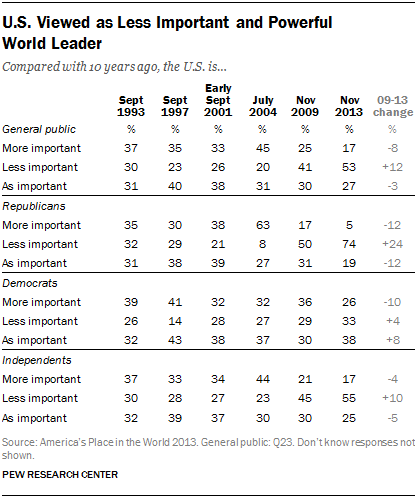
Just 17% say it plays a more important role, while 27% say it is about as important as it was in the past.
In 2009, 41% said the U.S. was less important as a world leader than it had been 10 years earlier, while 25% said it was more important (30% said it was about as important). From 1993 to 2004, higher percentages said the U.S. was more important than less important than it had been 10 years earlier.
Members of the Council on Foreign Relations are also far more likely to see the U.S. as a less important and powerful world leader: 62% express this view, compared with 44% in 2009 and 25% in early September 2001, shortly before the 9/11 attacks.
Among the public, the change in attitudes about America’s global role – both between 2004 and 2009 and between 2009 and now – reflects, for the most part, changes in opinion among Republicans and independents. Currently, 74% of Republicans say the U.S. plays a less important role as a world leader, compared with 50% in 2009 and just 8% in 2004, during the George W. Bush administration. Among independents, 55% now say the U.S. plays a less important role; 45% said the same in 2009 and 23% did so in 2004.
Democrats’ views about America’s importance as a world leader have been more stable, although fewer see the U.S. as more important and powerful than did so in 2009. Currently, 26% of Democrats say the U.S. plays a more important role as a world leader, 33% say it is less important, and 38% say it is as important as a decade ago. In 2009, 36% said the U.S. played a more important role, while 29% said it was less important and 30% said it was as important as it had been.
U.S. Widely Seen as Less Respected
Impressions of how the U.S. is perceived abroad improved soon after Barack Obama took office, but are now as negative as they were during the Bush administration.
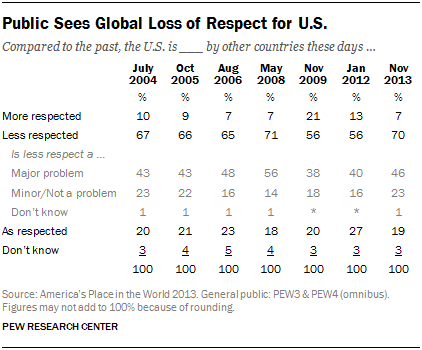
Seven-in-ten (70%) believe the U.S. is less respected by other countries than in the past; just 7% say the U.S. is more respected and 19% say it is as respected as in the past.
The percentage saying the United States is less respected is higher than in 2012 or 2009 (56% in each year) and is about as high as in May 2008, during George W. Bush’s final year in office (71%).
Most of those who say the United States is less respected than in the past – 46% of the public, overall – say this is a major problem. Just 23% of the public views the lack of respect as a minor problem or say it is not a problem.
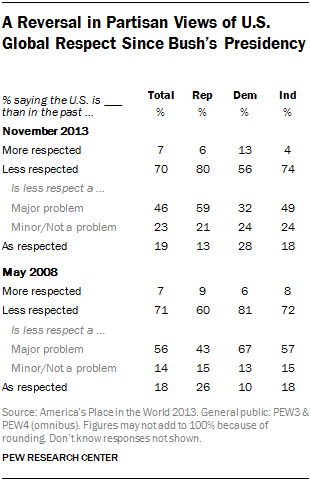
Republicans are now more likely to say the U.S. is less respected internationally – and to view this as a major problem – than during the Bush administration. Democrats, by contrast, are now less likely to see a loss of respect for the United States and to say it is a major problem than in 2008.
Currently, 80% of Republicans say the United States is less respected internationally and 59% see it as a major problem. In May 2008, 60% of Republicans said the U.S. was less respected and fewer than half (43%) viewed this as a major problem.
Democrats’ opinions have moved in the opposite direction. Today, 56% of Democrats say the U.S. is less respected internationally; only about third (32%) say the loss of respect is a major problem. Five years ago, 81% of Democrats said the U.S. was less respected, and two-thirds (67%) said the erosion of respect for the U.S. was a major problem.
U.S. Leadership Role
Consistent with past surveys, a large majority of Americans (72%) favor a shared leadership role for the United States. Far fewer say the U.S. should be the single world leader or play no leadership role (12% each).
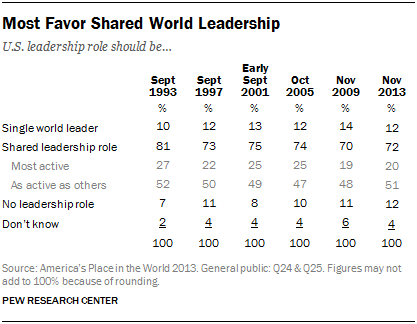
Of those who say the U.S. should play a shared leadership role, 70% (51% of the total public) think the U.S. should be about as active as other leading nations; 28% (20% overall) say it should be the most active of the leading nations.
Members of the Council on Foreign Relations also overwhelmingly favor a shared leadership role for the U.S. – 86% express this view. CFR members were then asked if the U.S. should be the most assertive of leading nations (the public was asked if the U.S. should be the most active). A majority of CFR members (55%) would like the U.S. to be the most assertive of the leading nations, while 24% say the U.S. should be no more or less assertive than other leading nations.
U.S. Role in Solving World Problems
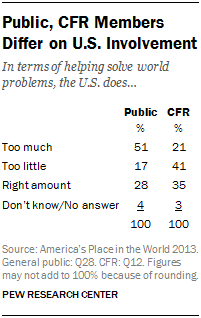
About half of the public (51%) say the U.S. does too much in terms of helping solve world problems, while 17% think the U.S. does too little and 28% think it does the right amount. This is virtually unchanged from 2002, when 47% said the U.S. did too much, 17% said it did too little and 31% said the U.S. did about the right amount in helping solve world problems
By contrast, about twice as many CFR members say the U.S. does too little internationally as say it does too much (41% vs. 21%); 35% say the U.S. does the right amount.
The survey of the general public finds modest differences in opinions about the U.S. role in helping to solve world problems. Comparable percentages of Republicans (52%) and Democrats (46%) say the United States does too much to solve world problems; among independents, 55% express this view.
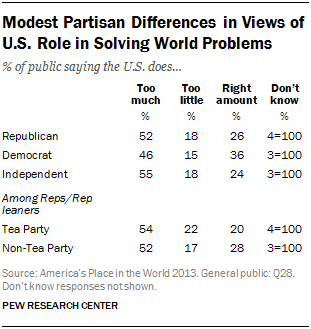
Democrats are more likely to say that the United States does the right amount to solve global problems (36% vs. 26% of Republicans and 24% of independents).
Tea Party Republicans hold about the same views as non-Tea Party Republicans about America’s role in solving world problems. About half of Republicans and Republican leaners who agree with Tea Party (54%) say the U.S. does too much to solve problems internationally, as do 52% of Republicans and GOP leaners who do not agree with the Tea Party.
Views of International Engagement

The public’s inclination toward less global engagement is also visible in answers to two questions that have been asked for nearly half a century. For the first time since 1964, more than half (52%) agree that the U.S. should “mind its own business internationally and let other countries get along the best they can on their own;” 38% disagree. Two years ago, the public was nearly evenly divided (46% agreed and 50% disagreed in May 2011) and, as recently as 2006, more disagreed than agreed that the U.S. should mind its own business internationally (53% vs. 42%).
Similarly, 80% agree with the statement, “We should not think so much in international terms but concentrate more on our own national problems and building up our strength and prosperity here at home,” up slightly from 76% in 2011. The level of support for this statement, which has been tested since 1964, now rivals the previous high set in the early 1990s.
Views on global engagement do not vary much across party lines. Majorities or pluralities of Republicans (52%), Democrats (46%) and independents (55%) think the U.S. does too much to try to help solve world problems, and agree that the U.S. should mind its own business internationally (53%, 46% and 55%, respectively). And close to eight-in-ten among each group agree that the U.S. should concentrate more on our own national problems, rather than thinking so much in international terms (82% of Republicans, 76% of Democrats and 79% of independents).
Working with Allies and the United Nations
Nearly eight-in-ten Americans (77%) agree that “in deciding on its foreign policies, the U.S. should take into account the views of its major allies,” virtually unchanged from 79% in 2011 and 78% in 2009. And most (56%) disagree that “since the U.S. is the most powerful nation in the world, we should go our own way in international matters,” although more agree with the statement now (38%) than at any time in nearly half a century, with the exception of 2009, when 44% agreed that the U.S. should go its own way internationally.
When it comes to working with the United Nations, 56% of the public agrees that the U.S. should cooperate fully with the international organization, which is virtually unchanged from 2011 (58%). The percentage of Americans saying the U.S. should cooperate with the United Nations reached its peak in 1991, when 77% of Americans agreed with this notion. In 2002, 67% said the U.S. should work with the institution.
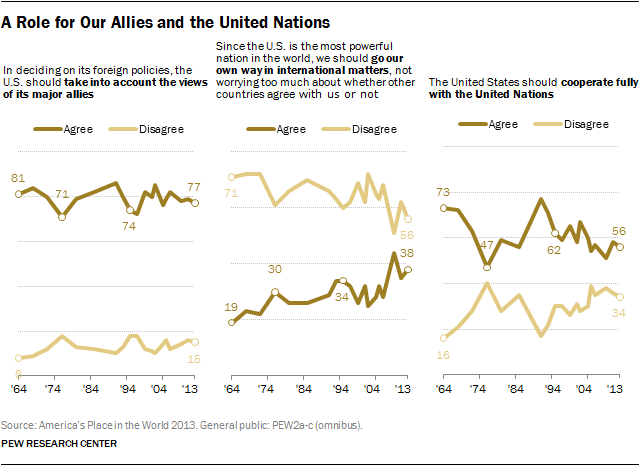
Republicans are more likely than Democrats and independents to say the U.S. should go its own way in international matters, regardless of what other countries think; 47% of Republicans express this view, compared with 30% of Democrats and 37% of independents. Conversely, Republicans are less likely than other groups to say the U.S. should cooperate fully with the United Nations (46% vs. 69% of Democrats and 57% of independents).
Most Favor Keeping U.S. as Only Superpower
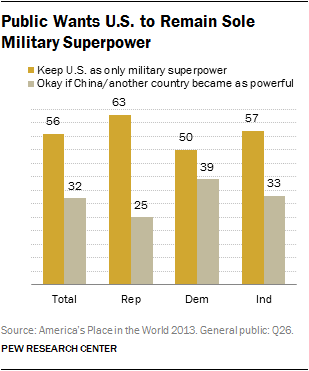
More than half of the public (56%) say U.S. policies should try to keep it so America is the only military superpower, while 32% say it would be acceptable if China, another country or the European Union became as militarily powerful as the United States. This view is virtually unchanged from 2009.
Republicans are especially inclined to say U.S. policies should ensure America’s position as the only military superpower. About six-in-ten (63%) say this is the case, compared with half of Democrats; 57% of independents also favor policies aimed at keeping the U.S. as the only superpower.
There is no evidence that the public sees America’s status as the world’s military superpower as eroding. About two-thirds (68%) name the U.S. as the world’s leading military power; 14% name China. In 2011, 67% said the U.S. was the world’s leading military power, and 63% shared this view in 2009.
In contrast, more Americans cite China as the world’s leading economic power than name the U.S. (48% vs. 31%), also largely unchanged from 2011 (47% China vs. 31% U.S.) and 2009 (44% vs. 27%). In early 2008, however, more named the U.S. as the world’s leading economic power than named China (41% vs. 30%).




